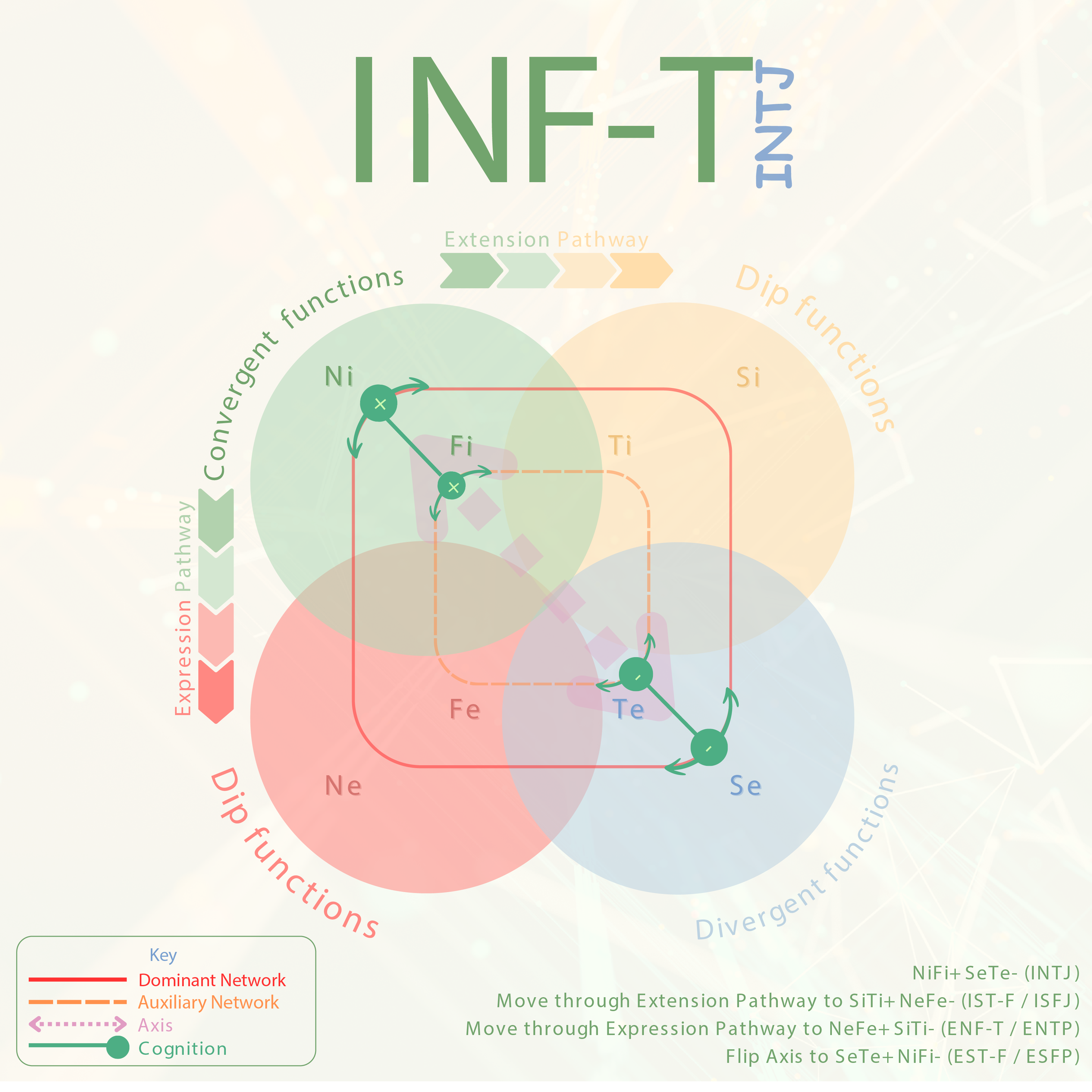
The INTJ, also known as iNF in Cognitive Personality Theory (CPT), is a disciplined and introspective type characterised by their dominant Introverted Intuition (Ni), agency Introverted Feeling (Fi), authority Extraverted Thinking (Te), and oppositional Extraverted Sensing (Se). This combination makes for someone who sees themselves as a concept and explores the potential of internal self-representations across themes, driven by a desire for survival and the avoidance of existential annihilation.
Dominant Position: Introverted Intuition (Ni)
As the dominant function, Introverted Intuition (Ni) provides the INTJ with a broad and expansive perspective, constantly seeking new themes and relational or existential information. This function excels at creating a conceptual buffer against external experiences, ensuring a deep sense of internal unity and universality.
How it Feels: For the INTJ, Ni dominance means having a rich and expansive internal landscape. They are constantly exploring new ideas and themes, seeking to connect and unify various concepts into a coherent whole. This focus on internal clarity allows them to feel grounded and certain about their understanding of the world and their place within it.
Agency Position: Introverted Feeling (Fi)
In the agency position, Introverted Feeling (Fi) provides the INTJ with the ability to assume total control of their destiny and personal boundaries. Fi is intensive and can be resistant to external pressures, ensuring that their internal values and goals remain strong and unyielding.
How it Feels: With Fi as their agency function, INTJs are deeply connected to their personal values and sense of destiny. They invest their ego in their ability to uphold their chosen path, making them resolute and determined in their pursuits. This function helps them maintain a strong sense of self, even in the face of external pressures.
Authority Position: Extraverted Thinking (Te)
Extraverted Thinking (Te) in the authority position acts as a guiding force for the INTJ, instilling an inherent sense of duty and conscientiousness. Te provides a regulatory influence, ensuring that their actions are aligned with objective standards and metrics.
How it Feels: Te in this position can feel like an internal anchor, ideally pushing the INTJ towards environments that provide tangible metrics that can reassure the type they are in line with - and taking steps towards - their chosen destiny. This function helps them stay focused on their goals and maintain a sense of order and efficiency in their actions. While this can sometimes feel restrictive and resistant to environmental change, it ultimately ensures that they remain disciplined and goal-oriented.
Oppositional Position: Extraverted Sensing (Se)
In the oppositional position, Extraverted Sensing (Se) serves as a delicate yet essential function. Se provides the INTJ with a cautious and expectant approach to the unexpected, ensuring orderliness by doubling down on personal boundaries that allow them to survive and stand firm even in chaotic circumstances.
How it Feels: Se in the oppositional position often feels like a subtle antenna into the world around them. While it can be a source of stress due to its sensitivity, it also provides valuable raw stimuli that help the INTJ achieve new and fresh insights as well as remind them of the larger world they are a part of. The sensitivity of this cognitive element often makes for a type gifted at energy conservation and the avoidance of burnout so long as they listen to an internal sense of logical scrutiny beyond the tangible metrics of Te.
Cognitive Dynamics and Dip Functions
The INTJ’s cognitive dynamics are characterised by their ability to refine and maintain their internal concepts and frameworks through NiFi. This type excels at creating a stable and reliable internal world, ensuring that their sense of self and understanding remains strong and consistent.
Dips:
NiFi - SiTi: Extending the holistic nature of internal archetype and destiny by doubling down on micro-interests on a granular level. This often leads to a scientific inclination, as they seek to understand the detailed mechanics of their chosen path.
NiFi - NeFe: Expressing the internal extensity of values and destiny into the pursuit and trans-archetypal exploration of other life paths that align with them. This dip allows the INTJ to channel their refined concepts into practical and engaging activities.
SeTe - NeFe: Showcasing their expertise to others, making a social splash through the granularity of their focused execution. This dip helps the INTJ develop and showcase their abilities in social settings in an impressive persona of conscientiousness, often leading to a demonstration of their skills and knowledge.
Conclusion
The INTJ (iNF) is a highly versatile type who excels at choosing their own destiny and adhering strictly to it. Their dominant Introverted Intuition (Ni) drives them to create a vivid and expansive internal world, while their agency Introverted Feeling (Fi) ensures that their personal values and sense of self remain strong and unyielding.
The authority Extraverted Thinking (Te) guides them towards discipline and efficiency, and the oppositional Extraverted Sensing (Se) provides a cautious watchfulness that keeps everything in order. Together, these functions create a personality that excels in high-level conceptual thinking and strives for a harmonious and unified understanding of the world, making them highly effective in structured and non-abusive environments.
Illustrations by Rivka B.